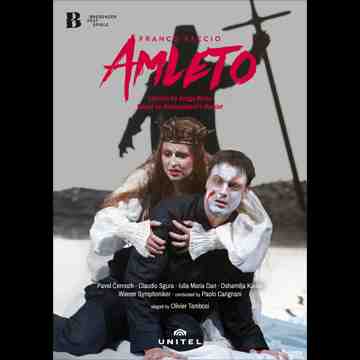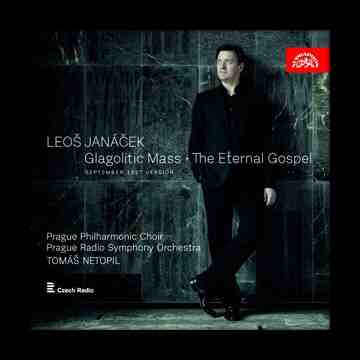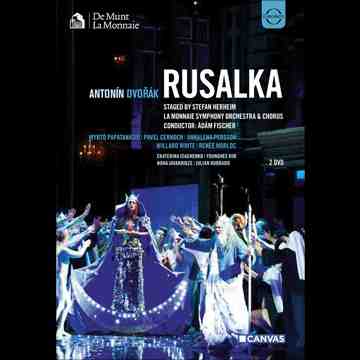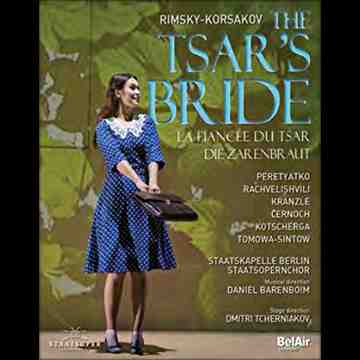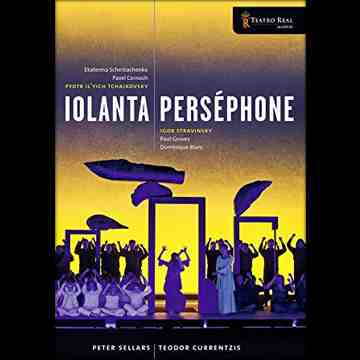Faccio: Hamlet
2016
Bregenz Festival 2016 Composer: Franco Faccio Pavel Černoch, Claudio Sgura, Iulia Maria Dan, Eduard Tsanga, Dshamilja Kaiser, Sébastien Soulès, Bartosz Urbanowicz, Paul Schweinester, Jonathan Winell, Sabine Winter Orchestra: Wiener Symphoniker Chorus: Prague Philharmonic Choir Stage Director: Oliver Tambosi Conductor: Paolo Carignani
This production “offers all an Italian-opera-lovercould possibly desire” wrote the Frankfurter Allgemeine Zeitung after the revival of this “forgotten gem” at the Bregenz Festival: on occasion of the fourth centenary of William Shakespeare’s death, the festival continued its rediscovery series with Amleto, an opera by Verdi contemporaries Franco Faccio and Arrigo Boito, based on Shakespeare’s tragedy Hamlet. Premiered in 1865 in Genoa and restaged in 1871 at Milano’s La Scala, “Amleto” was only revived in 2014 concertante in the US before its “triumphal rebirth” (Deutschlandradio Kultur) at the Bregenz Festival, where the opera was also recorded for the first time ever. Faccio, who conducted the first performance of Verdi’s Aida in Italy and the world premiere of Otello, and Boito, Verdi’s librettist of Otello and Falstaff, skillfully and effectively challenge the conventions of Italian opera, which they wanted to revitalize by infusing it with the spirit of Shakespeare’s drama. Anticipating the musical language of later Italian verismo composers, the opera combines lovely musical interludes with superb vocal writing. Heading a supreme cast, Pavel Černoch as Amleto delivers superbly, “using his colorful tenor skillfully to develop the transformation of the insecure youngling to the ice-cold avenger” (NZZ) and “granting the work large scale” (Abendzeitung). Iulia Maria Dan lends her melting soprano to Ofelia. Under the baton of Paolo Carignani with the Vienna Symphoniker and Prague Philharmonic Choir “it carried terrific punch (The Telegraph)”. Olivier Tambosi’s “excellent staging served it well, with a clear focus on the high points (The Telegraph)”. “In the intermission and at the end there was vociferous enthusiasm of the audience for the late first encounter with this music” (NeueMusikzeitung).
Janacek: Glagolitic Mass, The Eternal Gospel
2014
Composer: Leoš Janáček Pavel Černoch, Alžběta Poláčková, Andrea Danková, Tomáš Juhás, Jana Sýkorová Prague Philharmonic Choir Conductor: Tomáš Netopil
Dvorak: Rusalka
2014
Composer: Antonín Dvořák Myrtò Papatanasiu, Pavel Černoch, Annalena Persson, Willard White, Renée Morloc La Monnaie Symphony Orchestra & Chorus Stage Director: Stefan Herheim Conductor: Adam Fischer
Antonín Dvořák’s next to last opera draws its substance from the underwater wonderland of little mermaids, Undines and Melusines: Rusalka, a water nymph, wishes to become human in order to be loved by the young prince. Despite being warned against it, she asks the witch Ježibaba to help her. In order forher wish to be fulfilled, Rusalka must give up her voice and face eternal damnation if her love fails. Jaroslav Kvapil’s libretto inspired Dvořák to compose a masterpiece, a compelling opera full of poignantlyricism and dramatic twists. Ádám Fisher and Stefan Herheim masterfully present this ‘lyrical fairytale’ at La Monnaie, Belgium. La Monnaie has been acclaimed best opera house of the year 2011 (Opernwelt). In this widely acclaimed interpretation, the fairytale elements assume frighteningly realistic dimensions, making this enchanting production a psychoanalytical study of male fantasies and female archetypes. Includes 10-minute Behind-the-Scenes Bonus with Interviews with Stefan Herheim and others.
Rimskij-Korsakov: The Tsar's Bride
2013
Composer: Nikolaj Andrejevič Rimskij-Korsakov Pavel Černoch, Anatoli Kotscherga, Olga Peretyatko, Johannes Martin Kränzle, Tobias Schabel Staatskapelle Berlin Stage Director: Dmitri Tcherniakov Conductor: Daniel Barenboim
The argument is based on an historical case. In the suburbs of Moscow, reigned around 1571 Tsar Ivan IV, 'the Terrible'. Widowed, he is looking for a new wife for the third time. He chooses the young Marfa; she loves another man but bends to the will of the Tsar and renounces her love. From this starting plot, the Russian director Dmitri Tcherniakov retains only the frame. A live competition is organised for a virtual monarch like in a reality show called «Joe Millionaire » where competitors attempt to marry a rich man. Here, the characters become the various players of the audiovisual industry bringing an acerbic criticism of contemporary TV. Daniel Barenboim conducts the Staatskapelle Berlin, with Olga Peretyatko, Anita Rachvelishvili and Johannes Martin Kränzle. Recorded at Staatsoper, Im Schiller Theater Berlin, in October 2013.
Tchaikovsky: Iolanta / Stravinsky: Perséphone
2012
Composer: Pyotr Ilich Tchaikovsky / Igor Fjodorovič Stravinskij Cast of Iolanta: Ekaterina Scherbachenko, Alexej Markov, Pavel Černoch, Dmitry Ulianov Cast of Persephone: Dominique Blanc, Paul Groves Orquesta Titular del Teatro Real Conductor: Teodor Currentzis Stage Director: Peter Sellars
Iolanta is a one act lyric opera, sung in Russian, by Tchaikovsky. Performed in the style of a nineteenth-century Italian melodrama, the scenes have a recitative introduction followed by a single arioso, aria, duet or chorus. Persephone is a three act melodrama, sung in French, by Stravinsky. It is a story of regeneration, symbolised in Sellars use of dancers from the Cambodian dance company, Amrita Performing Arts. Peter Sellars, one of the most innovative creators on today's stage, has linked these two productions by using the same stage setting, instantly archaic yet modern, and lit by rich colours to define the journey from darkness to light.

